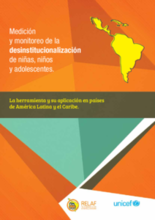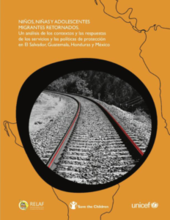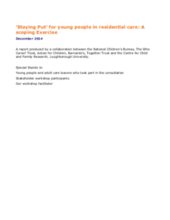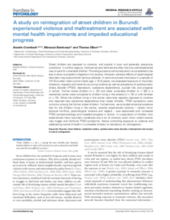Displaying 831 - 840 of 956
El objetivo del estudio es presentar el proceso de construcción de una herramienta para medir la institucionalización en forma rápida, a partir de información existente en los países y mostrar los principales datos que se obtuvieron.
The aim of this book is to explain to children what to expect during the time the institution in which they reside is closing.
This paper calls for creative pathways of engagement that delineate places of belonging for and with Indigenous youth in care.
Esta evaluación rápida busca cubrir la escasez de información sobre las políticas y los servicios de las entidades gubernamentales y no gubernamentales encargadas de la protección de los derechos de niños, niñas y adolescentes migrantes retornados a sus sociedades de origen en los países del Triángulo del Norte y México, con un foco en las acciones tendientes a restituir el derecho a la convivencia familiar y la integración comunitaria.
Through a desk review of peer reviewed journal and “grey” literature published in English and Russian languages, this paper provides a review of current deinstitutionalization efforts in the region, identifies potential challenges, describes the need for economic empowerment interventions, and outlines directions for future research.
This video, from Forget Me Not, features the story of Alisha, a young girl in Nepal who was separated from her family and taken to a children’s home in Kathmandu.
This study is purposely looking at issues around institutionalization and the experiences of resettled youth resulting from the social and economic challenges that affect them in independent living, tackling how they are negotiating and overcoming them.
This report explores options for young people aging out of residential care (“care leavers”) and the potential challenges and costs of effective implementation of those options.
This article outlines findings from research on current and former street children in Burundi, that assesses the extent to which violence can affect children’s mental well-being and psychological functioning, and thus limit their reintegration.
This study investigates the specific training needs of the biological family during the transition phase of the reunification process in which the child prepares to return home.






